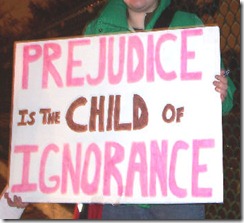 When I was in high school that word had one basic connotation – racial prejudice. In the deep south the emotions ran deep and often erupted in violence. I would often hear people say things like, “He’s black, but he is a good worker.” right away you could tell what side of the racial divide the speaker was on.
When I was in high school that word had one basic connotation – racial prejudice. In the deep south the emotions ran deep and often erupted in violence. I would often hear people say things like, “He’s black, but he is a good worker.” right away you could tell what side of the racial divide the speaker was on.
I have recently discovered that prejudice extends to other areas as well. Even people who are educated and progressive often operate out of stereotypes and prejudice rather than listening to what a person is really saying. “Oh, they are only saying that because they are _________________” (fill in the blank with Liberal, Republican, Latino, Conservative, etc.) Not necessarily.
In politics, if you don’t agree with the party in power, you are partisan and just making political decisions. If some one uses a specified code word, they are automatically in lock step with the worst imaginable element of society that just happens to use that word as well.
If a person questions a particular interpretation of Scripture, that person is automatically accused of either liberalism or fundamentalism, depending on the topic, and then all of the negative assumptions about the extremes are attributed to that person. This really makes honest discourse difficult.
In the interest of full disclosure, I have been on both sides of this prejudice. I have made snap judgments and snap judgments have been made about me. When I have been on the “victim” side of the equation I find myself wondering, “how did they get that from what I said?” The answers is preconceived perceptions.
I think the only way to counter this tendency in all of us remember some very important things:
- Remain open minded and don’t assume the worse. If you disagree with a person’s position on an issue, seek understanding. Don’t automatically assume you know the person’s complete position, simple because they use a particular word that other more radical persons might use.
- Remain teachable. We could all be wrong! Just because I have deeply held beliefs does not mean I am correct. When disagreements occur deal with the issues and evidence—don’t commit the genetic fallacy which condemns a view because of where it came from.
- Remain humble. None of us are as smart as we would like to think and all of us have huge gaping holes in our understandings. The only way I know of to keep learning is to be humble enough to examine the evidence. that goes for “yellow dog Democrats” and “Red dog Republicans.”
- Seek the truth no matter what. The issue is not, “can I argue the other person into submission,” but am I authentically seeking the truth. If I honestly seek the truth, I may discover that many of my pet views are based more on little more than emotion or political correctness. This point has come home as I have watched all the political rhetoric recently. No matter what news show you watch, the bias is very evident and the real causality is the truth.

